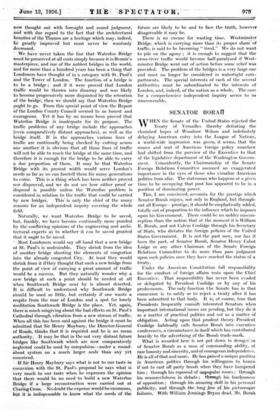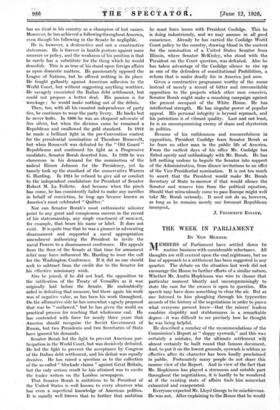• SENATOR BORAH
AAT HEN- the Senate of the United States rejected the Y V. Treaty of Versailles thereby defeating the cherished hopes of Woodrow Wilson. and indefinitely delaying American _ entry into the. League of Nations; a world-wide impression was given, it seems, that the source and seat of American _ foreign . policy somehow had shifted from. the purview of the Executive to that of the legislative department of the Washington Govern- ment. Coincidently, the Chairmanship of the Senate Foreign Relations Committee assumed an exaggerated importance in the eyes of .those who visualize American politics from afar. The stateirnan who happens at 'a given time to be occupying that post has appeared to be in a . position of dominating power. This, I am corwineed, accounts for the prestige which Senator Borah enjoys, not only inEngland, but through- out all Europe—prestige; it should be emphatically added, totally out of proportion to the influence which he imposes upon his Government. There could_ no sadder Janson- ception than the notion that at the moment it is William E. Borah, and not Calvin Coolidge through Secretary of State, who dictates the_ foreign .policies of the United States Government. It is not the. part now,, nor has it been the part, of Senator Borah, Senator Henry Cabot Lodge or any other. Chairman of the Senate_ Foreign Relations Committee to do more than pass judgment upon such policies once they have reached the status, of a treaty. - - - Under the American Constitution full responsibility for the conduct of foreign affairs rests upon .the Chief Executive. That responsibility has never been evaded or delegated by . President Coolidge or by.. any of his predecessors. _The Only function the. Senate has in that connexion is to ratify or to reject a treaty after it has been submitted to that body. It is, of course, true that Presidents _frequently consult interested Senators when important international issues are, pending, but they do it as a matter of practical. politics and not as a matter of obligation. Acting upon- that prudent theory. President Coolidge . habitually vans: Senator. _Borah into. executive conferences, a circumstance in itself which has contributed heavily to the advertising of the Borah tracle-mark. What is, recorded here is not put down in derop,at!3n Of Senator Borah as a man of commanding ability, of rare honesty and aincerity,-and of courageous independence. He is all ofthatand more He has gained a unique.positiou in American politics through his..willingruss to loosen if not tci cast Off _Party :bon& when_ they. hp.y.e lia_111.13e.red him; through. his espousal a unpopular issues.; -through his -resourcefulness in debate-; _through his fearlessness of opposition; , through. his .anuizing..skill . . his .personal publicity,. mid. Lthrough.the _long fine .9f his ,pieturpsqUe faihires.. With 'William Jennings Bryan dead, Mr. Borah, has no rival in his country as a champion of lost causes. Moreover, he has achieved a following throughout America, even though- his following in the Senate be negligible.
He is, - however, a destructive and not a constructive statesman. He is forever in hostile posture against some measure or policy, and the weakness of his position is that he rarely has a substitute for the thing which he would demolish. This is as true of his stand upon foreign affairs as upon domestic matters. He passionately opposed the League of Nations, but he offered nothing in its place He fought gallantly against American adhesion to the World Court, but without suggesting anything worthier.
• He savagely excoriated the Italian debt settlement, but• • could not propose a better deal. His passion is for wreckage ; he would make nothing out of the debris.
• Then, too, with all his vaunted independence of party • ties, he continues to wear. the party livery. He bucks but he never bolts. In 1896 he was an eloquent advocate of free silver, but when the division came he remained a Republican and swallowed the gold standard. In 1912 he Made d brilliant fight in the pre-Convention contest for the presidential nomination of Theodore Roosevelt, but when Roosevelt was defeated by the "Old Guard" Republicans and continued his fight as a Progressive dandidate, Senator Borah deserted him. In 1920 he was clamorous in his demand for the nomination of the radical Hiram Johnson for the Presidency, yet he tamely took up the standard of the conservative Warren G. Harding. In 1924 he refused to give aid or comfort to the -independent candidature for President of Senator Robert M. La Follette. And because when the pinch has come, he has consistently failed to make any sacrifice in behalf of conviction, he long ago became known as America's most celebrated " Quitter."
Nor can Senator Borah's most enthusiastic admirer point to any great and conspicuous success in the record of his statesmanship, any single enactment of moment, for example, that bears his name or label. It does not exist. It is quite true that he was a pioneer in advocating disarmament and supported a naval appropriation amendment authorizing the President to invite the naval Powers to a disarmament conference. His appeals from the floor of the Senate at that time for armament relief may have influenced Mr. Harding to issue the call for the Washington. Conference. If it did no one should seek to subtract from the credit due to the Senator for his effective missionary work.
Also he joined, if he did not lead, the opposition to the ratification of the Treaty of Versailles as it was originally laid before the Senate. He undoubtedly aided in defeating that measure, but there again his work was of negative value, as has been his work throughout. On the affirmative side he has somewhat vaguely proposed that war be "outlawed," but he has given the world no practical process for reaching that wholesome end. He has contended with force for nearly three years that , America should recognize the Soviet Government of Russia, but two Presidents and two Secretaries of State have ignored his demands.
Senator Borah led the fight to prevent American par- ticipation in the World Court, but was decisively defeated. Ile led the fight to prevent the acceptance by Congress of the Italian debt settlement, and his defeat was equally decisive. He has raised a question ds to the collection of the so-called "blockade claims" against Great Britain, but the only serious result he Inik attained was to excite the leader writers on the London newspapers. That Senator Borah is ambitious to be President of the United States is well known to every observer who has even a superficial knowledge of American politics. It is equally well known that to further that ambition he must force issues with President Coolidge. This he is doing industriously, and we may assume in all good conscience. Already he has carried the Coolidge World Court policy to the country, drawing blood in the contest for the nomination of a United States Senator from Illinois, where Senator McKinley, who stood with the President on the Court question, was defeated. Also he has taken advantage of the Coolidge silence to rise up as one of the defenders of constitutional Prohibition, a reform that is under deadly fire in America just now.
Given a constructive programme worthy of the name instead of merely a record of bitter and irreconcilable opposition to the projects which other men conceive, Senator Borah might make a smashing campaign against the present occupant of the White House. He has intellectual strength. He has singular power of popular appeal. His personal integrity is beyond reproach, and his patriotism is of vibrant quality. Last and not least, he is an uncompromising enemy of sham and shysterisrn in politics.
Because of his ruthlessness and resourcefulness in opposition, President Coolidge fears Senator Borah as he fears no other man in the public life of America. From the earliest days of his office Mr. Coolidge has flirted openly and unblushingly with Mr. Borah. He has left nothing undone to beguile the Senator into support of the Administration, from dinner invitations to an offer of the Vice-Presidential nomination. It is not too much to assert that the President would make Mr. Borah Secretary of State to -morrow if that would silence the Senator and remove him from the political equation. Should that miraculously come to pass Europe might well take Mr. Borah seriously. It need not do so, however, as long as he remains merely our foremost Republican insurgent.
J. FREDERICK ESSARY.























































 Previous page
Previous page